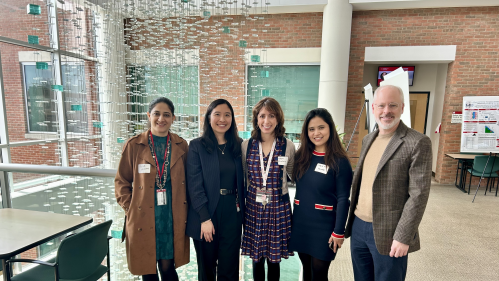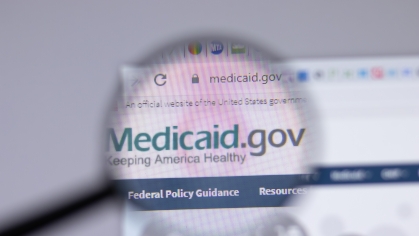Advancing Health Across Generations: Highlights from the Reproductive, Perinatal, and Pediatric Research Summit

Pregnancy and early childhood represent some of the most sensitive and critical windows in the human lifespan. During these periods, exposures and risk factors can have amplified effects on lifelong health, making reproductive, perinatal, and pediatric populations a top priority for public health research.
On Wednesday, March 26, the Rutgers School of Public Health hosted a half-day Research Summit in Piscataway that brought together a diverse group of scientists across Rutgers Health to discuss cutting-edge work in reproductive, perinatal, and pediatric health.
Attendees included experts in biostatistics and epidemiology, health services research, health economics, toxicology, pharmacy, obstetrics and gynecology, and cardiology—a true reflection of the interdisciplinary nature of this growing research area.
Building Connections, Shaping the Future
The summit featured compelling presentations from School of Public Health faculty and collaborators, highlighting opportunities to tackle maternal and child health issues facing New Jersey and the nation. Discussions centered on:
- Interdisciplinary collaboration to improve research and policy
- The mechanistic underpinnings of disease across generations
- The need to train and support the next generation of scientists in this field
A major takeaway from the summit was the call to create institutional infrastructure and career development pathways that will enable sustainable progress in reproductive, perinatal, and pediatric health research.
Presentation Highlights:
Policy Research in Social Determinants of Maternal and Child Health (PRISM) | Slawa Rokicki, PhD & Mark McGovern, PhD
- Exploring how social and environmental policies impact maternal and child well-being and access to care.
Epidemiology of Early Life Adversity and Chronic Disease | Ayana April-Sanders, PhD, MPH
- Investigating strategies to prevent cardiovascular and metabolic diseases while promoting resilience to early life stressors.
Perinatal Pharmacoepidemiology | Elizabeth Suarez, PhD, MPH
- Research on antidepressant use and gastrointestinal disorders—examining gut-brain interactions during pregnancy.
Health Services Research: Policy and Maternal Health | Erica Eliason, PhD, MPH
- Analyzing Medicaid enrollment and postpartum healthcare utilization to improve maternal health systems.
Global Health Methodologies in Nutrition Research | Gwenyth O. Lee, PhD & Shauna Downs, PhD, MS
- Sharing findings from The DISHI FITI ISHI FITI (Eat Well, Live Well) Project—a mixed-methods study of dietary patterns and food insecurity.
Keynote Seminar: Multi-Omic Insights into the Placenta and Preterm Birth | Alison Paquette, PhD, Seattle Children's Research Institute
- Using systems biology to understand how the placenta mediates prenatal environmental exposures and their role in preterm birth.
This summit marks an exciting step forward in bringing together Rutgers researchers around shared goals to improve maternal and child health across the lifespan.
Interested in collaborating, supporting these initiatives, or learning more?
Reach out to Dr. Ellen C. Francis, Assistant Professor of Epidemiology, Rutgers School of Public Health: ellen.francis@rutgers.edu


